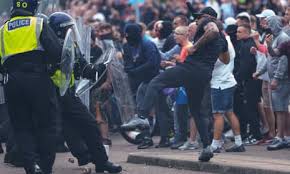Reflections: The day soldiers burnt down Fela’s house, killed his mother

LAGOS, Nigeria, Feb. 19, 1977—Several hundred soldiers attacked the home of Nigeria’s best‐known musician and most prominent dissident yesterday, setting ablaze and touching off a five‐hour disturbance in the sprawling slum section of Lagos known as Surulere.
The riot, in which the soldiers beat passers‐by with clubs and were themselves pelted with rocks and bottles, was the latest in a series of clashes between civilians and the armed forces under Nigeria’s military Government.
Ten days earlier, a similar but less violent disturbance occured near the cornmune‐style home of the musician. Fela Anikulapo‐Kuti, which was protected by barbed wire.
The 38‐year‐old Mr. Anikulapo‐Kutl, a son of one of Nigeria’s most illustrious families, is a gadfly to the military Government, which he frequently attacks in song and patter from the stage of his own ramshackle nightclub, the Shrine. Styled the “chief priest” of Afro‐beat music, he is a cult figure to thousands of Nigerian youths.
The most outspoken dissident in the country, he often accuses the Government of heavy‐handed actions, in such things as the clearing of Lagos traffic jams by whipping of motorists, and suggests that the military will not turn the country over to civilian rule in 1979 as it has promised.
After Decades of Drinks and Laughs, Is It Last Call at the Friars Club?
May 15, 2023
James Gunn Always Knew How ‘Guardians of the Galaxy Vol. 3’ Would End
May 12, 2023
She Wrote a Blistering Satire About Publishing. The Publishing Industry Loves It.
May 12, 2023
Listen to the Mother of All Playlists
May 12, 2023
Soldier Said to Have Been Beaten
The cause of yesterday’s disturbance was not known. Residents who were fleeing the soldiers with their arms raised in the air said that it began at 2 P.M. when the soldiers attacked the two‐story yellow house, called the “Kalakuta Republic,” in retaliation for the beating of a soldier by “Fela’s boys.” The altercation, in which a soldier’s motorcyle was set on fire, arose after a traffic violation, it was said.
Thanks for reading The Times.
Subscribe to The Times
Witnesses reported that the soldiers severely beat 60 men and women members of the commune, forcing them to strip naked and then taking them to a hospital for treatment, where they were held under armed guard. Two reporters attempting to cover the incident were also beaten.
The soldiers set fire to three vehicles, the house and the nightclub, which is half a block away. There were no reliable reports on the number of injured or the whereabouts of Mr. Anikulapo‐Kati, who had been arrested six times before and is currently pressing a lawsuit for $1.6 million, stemming from a raid on the compound in November 1974.
ADVERTISEMENT
Continue reading the main story
Although the military Government is popular with many Nigerians, spontaneous fights between civilians and soldiers are not uncommon. Thirteen months ago there was a 20‐hour melee in Ibeia, on the outskirts of Lagos, in which four persons were killed and more than 50 injured, and 100 houses were burned down.
Festivals Often Stir Violence
It began when soldiers intervened in a squabble, between local traders and masqueraders, members of a cult who dress up on festival days and demand obeisance from onlookers. Using machetes and other weapons, the soldiers beat back an attempt by the police to restore order.
Many of the clashes occur on festival days. The customs of the masqueraders, a boisterous but usually jovial lot who have a tradition of manhandling those who do not remove their shoes as a sign of respect, are foreign to many of the soldiers, who come from other parts of the country.
In addition, the military is sometimes undisciplined and not under the effective control of the officer corps, which is small for a 250,000‐man force. Because of a lack of barracks, soldiers are often quartered in civilian areas, contributing to tensions.

